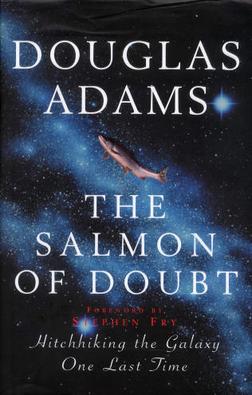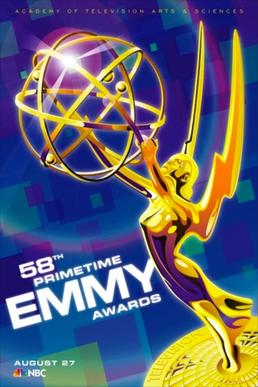Related Research Articles

The Hitchhiker's Guide to the Galaxy is a comedy science fiction franchise created by Douglas Adams. Originally a 1978 radio comedy broadcast on BBC Radio 4, it was later adapted to other formats, including novels, stage shows, comic books, a 1981 TV series, a 1984 text adventure game, and 2005 feature film.

Dirk Gently's Holistic Detective Agency is a humorous detective novel by English writer Douglas Adams, published in 1987. It is described by the author on its cover as a "thumping good detective-ghost-horror-who dunnit-time travel-romantic-musical-comedy-epic".

The Salmon of Doubt: Hitchhiking the Galaxy One Last Time is a posthumous collection of previously published and unpublished material by Douglas Adams. It consists largely of essays, interviews, and newspaper/magazine columns about technology and life experiences, but its major selling point is the inclusion of the incomplete novel on which Adams was working at the time of his death, The Salmon of Doubt. English editions of the book were published in the United States and UK on 11 May 2002, exactly one year after the author's death.

Tricia Marie McMillan, also known as Trillian Astra, is a fictional character from Douglas Adams' series The Hitchhiker's Guide to the Galaxy. She is most commonly referred to simply as "Trillian", a modification of her birth name, which she adopted because it sounded more "space-like". According to the movie version, her middle name is Marie. Physically, she is described as "a slim, darkish humanoid, with long waves of black hair, a full mouth, an odd little knob of a nose and ridiculously brown eyes," looking "vaguely Arabic."
The 39th Annual Grammy Awards were held on February 26, 1997, at Madison Square Garden, New York City. They recognized accomplishments by musicians from the previous year. Babyface was the night's biggest winner, with 3 awards. Celine Dion, Toni Braxton, Sheryl Crow, and The Fugees won two awards. Celine Dion for "Best Pop Album" and "Album of the Year" and Toni Braxton for "Best Female R&B Vocal Performance" and "Best Female Pop Vocal Performance". The show was hosted by Ellen Degeneres who also performed the opening with Shawn Colvin, Bonnie Rait, and Chaka Khan.
Börte was the first wife of Temüjin, who became Genghis Khan, the founder of the Mongol Empire. Börte became the head of the first Court of Genghis Khan, and Grand Empress of his Empire. Little is known about the details of her early life, but she was betrothed to Genghis at a young age, married at seventeen, and then kidnapped by a rival tribe. Her husband's daring rescue of her may have been one of the key events that started him on his path to becoming a conqueror. She gave birth to four sons and five daughters, who, along with their own descendants, were the key bloodline that further expanded the Mongol Empire.

"Turtles all the way down" is an expression of the problem of infinite regress. The saying alludes to the mythological idea of a World Turtle that supports a flat Earth on its back. It suggests that this turtle rests on the back of an even larger turtle, which itself is part of a column of increasingly larger turtles that continues indefinitely.
Mstislav Romanovich the Old was Prince of Pskov (1179–?), Smolensk (1197–?), Belgorod (1206), Halych (?–?) and Grand Prince of Kiev (1212–1223). He was the son of Roman Rostislavich.
The Utterly Utterly Merry Comic Relief Christmas Book was a fundraising book issued on behalf of Comic Relief in 1986. It was edited by Douglas Adams and Peter Fincham and contained contributions from Adams and many of the leading comedy writers and performers of the day.

The Battle of the Kalka River was fought between the Mongol Empire, whose armies were led by Jebe and Subutai, and a coalition of several Rus' principalities, including Kiev and Galicia-Volhynia, and the Cumans under Köten. They were under the joint command of Mstislav the Bold and Mstislav III of Kiev. The battle was fought on May 31, 1223 on the banks of the Kalka River in present-day Donetsk Oblast, Ukraine, and ended in a decisive Mongol victory.
The Tertiary Phase, Quandary Phase, Quintessential Phase and Hexagonal Phase are respectively the third, fourth, fifth and sixth series of The Hitchhiker's Guide to the Galaxy radio series. Produced in 2003, 2004 and 2018 by Above the Title Productions for BBC Radio 4, they are radio adaptations of the third, fourth, fifth and sixth books in Douglas Adams' The Hitchhiker's Guide to the Galaxy series: Life, the Universe and Everything; So Long, and Thanks For All the Fish; Mostly Harmless and And Another Thing....
Out of the Trees is a 1975 television sketch show pilot written by Graham Chapman, Douglas Adams and Bernard McKenna that was broadcast on BBC 2 in 1976. The show shared some of the stream-of-consciousness style of Monty Python's Flying Circus, of which Chapman was a member. Actors included Chapman, Mark Wing-Davey and Simon Jones. The instrumental theme tune was by Neil Innes.

The 58th Primetime Emmy Awards were held on Sunday, August 27, 2006, at the Shrine Auditorium in Los Angeles, California on NBC at 8:00 p.m. ET with Conan O'Brien hosting the show. The ceremony attracted 16.2 million viewers, 2.5 million fewer than the previous year's ceremony, but still the ratings winner for the week. The Discovery Channel received its first major nomination this year.

The location of the burial place of Genghis Khan has been the subject of much speculation and research. The site remains undiscovered, although it is generally believed that it is near the Mongol sacred mountain of Burkhan Khaldun in the Khentii Mountains.

Genghis Khan is a 1965 biographical adventure film directed by Henry Levin and starring Omar Sharif, depicting a fictionalized account of the life and conquests of the Mongol emperor Genghis Khan. Distributed in the United Kingdom and the United States in 1965 by Columbia Pictures, the film also features James Mason, Stephen Boyd, Eli Wallach, Françoise Dorléac and Telly Savalas.

Genghis Khan, also Chinggis Khan, was the founder and first khan of the Mongol Empire, which he ruled from 1206 until his death in 1227; it later became the largest contiguous empire in history. After spending most of his life uniting the Mongol tribes, he launched a series of military campaigns, conquering large parts of China and Central Asia.
Between 1219 and 1221, the Mongol forces under Genghis Khan invaded the lands of the Khwarazmian Empire in Central Asia. The campaign, which followed the annexation of the Qara Khitai Khanate, saw widespread devastation and atrocities. The invasion marked the completion of the Mongol conquest of Central Asia, and began the Mongol conquest of Persia.

The Mongols were highly tolerant of most religions during the early Mongol Empire, and typically sponsored several at the same time. At the time of Genghis Khan in the 13th century, virtually every religion had found converts, from Buddhism to Eastern Christianity and Manichaeanism to Islam. To avoid strife, Genghis Khan set up an institution that ensured complete religious freedom, though he himself was a Tengrist. Under his administration, all religious leaders were exempt from taxation, and from public service. Mongol emperors were known for organizing competitions of religious debates among clerics, and these would draw large audiences.

The Mongol conquest of Persia comprised three Mongol campaigns against Islamic states in the Middle East and Central Asia between 1219 and 1258. These campaigns led to the termination of the Khwarazmian dynasty, the Nizari Ismaili state, and the Abbasid Caliphate of Baghdad, and the establishment of the Mongol Ilkhanate government in their place in Persia.
References
- ↑ Entry from LocusMag Index to Science Fiction
- ↑ "The Private Life of Genghis Khan" at DouglasAdams.com